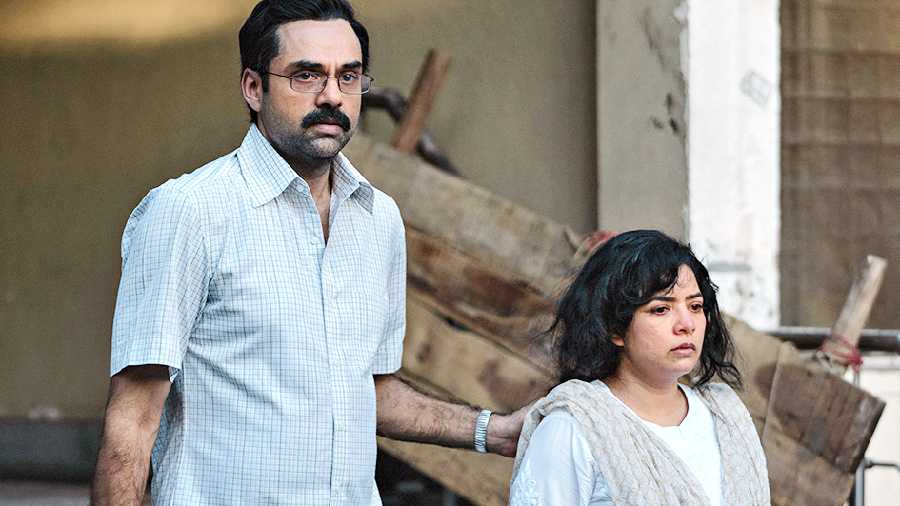The most remarkable thing about Trial By Fire is how, despite having a theme so potent for a permanent state of emotional overwroughtness, it narrates its tale of unspeakable tragedy in an impressively restrained manner, the calamitous state of its protagonists only being expressed through their eyes, sometimes vacant, sometimes brimming over, mostly distraught but determined.
The seven-episode series chronicles the aftermath of the Uphaar cinema fire of the 1990s, a tragedy that may have, on the surface, affected only the families of the 59 victims, but in reality shook the entire country. The battle for justice, which has been longdrawn, bitter and exhausting, has exposed systemic apathy as well as loopholes that are glossed over by both corruption and a ‘chalta hai’ attitude.
The tragedy itself, and the tragic circumstances that followed it, are fertile ground for effective and engaging storytelling, with Trial By Fire drawing much of its plot from the book Trial by Fire: The Tragic Tale of the Uphaar Fire Tragedy written by Neelam and Shekhar Krishnamoorthy. The Krishnamoorthys lost both their teenaged children in the fire, and it’s their story — their initial shock and grief giving way to a resolute fight for justice and redressal — that forms the core of the series.
In this series directed by Prashant Nair and currently streaming on Netflix, Neelam Krishnamoorthy is played by Rajshri Deshpande. The actor, who has impressed with her studied turns in roles as diverse as those in Sacred Games and Manto, fleshes out Neelam with myriad emotions but one singular goal — tracing a life dedicated to battling the system for 25 years.
A remarkable actor, Rajshri is the perfect choice for Neelam. She sheds vanity to fully inhabit the part of a woman who starts her quest for justice as a mother but ultimately becomes a crusader.
The yin to Rajshri’s yang is Abhay Deol, whose Shekhar, despite deeply mourning the untimely demise of his children, may come off as almost dispassionate compared to Neelam, largely because of his personality type, but who, from the first, is more focused in bringing about a correction in the system, even as he fights to bring the culprits to book.
A vastly underrated actor, Abhay imbues Shekhar with a steely resolve but also makes him more human than Neelam. Shekhar fights day and night, but also recognises that he and Neelam have to live a life beyond it.
Like Sardar Udham, where director Shoojit Sircar traced the revenge-driven journey of the film’s eponymous protagonist and focused on the tragedy of the Jallianwala Bagh massacre — which kickstarted Udham’s journey — only in the end, in what is perhaps the most traumatising last hour ever witnessed in Hindi mainstream cinema, Trial By Fire shows the tragedy of the fire at Uphaar cinema — unsuspecting victims enjoying a film one minute, choking on thick smoke the next, and ultimately dying in their seats that quickly became coffins. It’s traumatic but also integral to the story, and that it comes at the end, delivers an even bigger emotional wallop, making the viewer feel the tragedy even more because of what we have experienced in the six episodes before that.
Trial By Fire, as the disclaimer states at the beginning, takes certain cinematic liberties, sketching characters and circumstances beyond the core of what possibly happened. Like the track involving a former armyman (played by Anupam Kher) who constantly rues to his wife (Ratna Pathak Shah) how he should have been a part of the 1971 India Pakistan war, but couldn’t because of certain reasons. He lands up on that fateful evening of June 13, 1997, to see for himself how the film Border — the week’s new release — has painted the details of that conflict on celluloid. Whether he and his wife live to tell the tale is something we won’t spoil for you, but what seems to be an unnecessarily superfluous subplot at first, almost nearly ties up with the larger story at the end.
Fictionalising certain elements doesn’t however mean that Trial By Fire shies away from telling it as it was. The Ansals, the owners of the cinema who allowed Uphaar to turn into a tinderbox and then washed their hands off the tragedy without as much as a show of solidarity with the victims’ families, are named and shamed, with the series pulling no punches in showing how they shamelessly used money and power to bend the law on more than one occasion. Trial By Fire may have faced a court injunction for the same but the fact that it is now streaming illustrates that truth ultimately wins. Or at least we hope it does.
I liked/ didn’t like Trial By Fire because... Tell t2@abp.in










